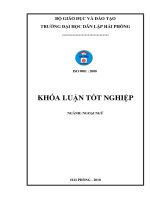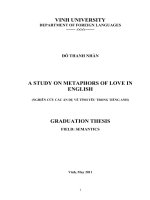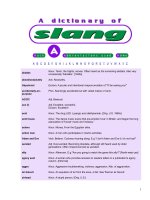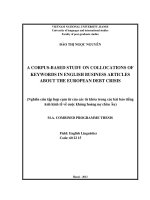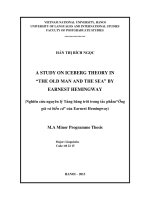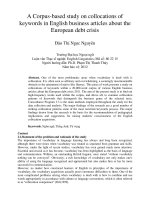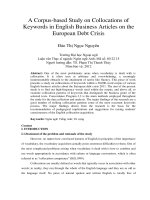A study on usages of slang in english language
Bạn đang xem bản rút gọn của tài liệu. Xem và tải ngay bản đầy đủ của tài liệu tại đây (678.45 KB, 45 trang )
HANOI OPEN UNIVERSITY
CODE: 29
FACULTY OF ENGLISH
GRADUATION THESIS
B.A DEGREE IN ENGLISH STUDIES
A STUDY ON USAGES OF SLANG IN ENGLISH LANGUAGE
Supervisor:
MA. Pham Thi Bich Diep
Student:
Dang Vu Tuan Phong
Date of birth: 12/26/1994
Course:
1271A05 (2012-2016)
HANOI, 2016
DECLARATION
Title: “A study on usages of slang in English language”
I certify that no part of the above report has been copied or reproduced by me
from any other’s work without acknowledgement and that the report is originally
written by me under strict guidance of my supervisor.
Hanoi, 15th April, 2016
Student
Supervisor
Dang Vu Tuan Phong
MA. Pham Thi Bich Diep
ACKNOWLEDGEMENTS
I would like to express my gratitude to my supervisor, Ms Pham Thi Bich Diep,
for being the person to instruct and help me achieve the result of this research at
this point.
I would also like to express my thanks to my parents, as well as all my friends
and teachers at Faculty of English for their support, encouragement and concern
that has helped me come this far.
Thank you to you all.
Hanoi, 15th April, 2016
Dang Vu Tuan Phong
TABLE OF CONTENTS
PART A: INTRODUCTION……………………………………01
1. Rationale……………………………………………………………01
2. Aims and purposes of the study…………………………………...02
3. Scope of the study…………………………………………………..02
4. Research questions…………………………………………………02
5. Methods of the study……………………………………………….03
6. Design of the study…………………………………………………03
PART B: DEVELOPMENT…………………………………….04
CHAPTER 1: LITERATURE REVIEW………………………………..04
1.1.
Definition of slang………………………………………………04
1.2.
History of slang…………………………………………………08
1.3.
Classification of slang…………………………………………..10
CHAPTER 2: FINDINGS, INTERPRETATION AND ANALYSIS….17
2.1.
Slang in language and culture………………………………….17
2.1.1. Slang in British culture……………………………………...20
2.1.2. Slang in American culture…………………………………..24
2.2.
Influences of slang on the English language…………………..28
CHAPTER 3: APPLICATIONS, CONTRIBUTIONS, SOLUTIONS...31
3.1.
English slang in different aspects of life……………………….31
3.1.1. Slang in daily life…………………………………………….31
3.1.2. Slang in workplace…………………………………………..33
3.1.3. Slang in music………………………………………………..34
3.2.
How to improve in learning and using slang effectively……...35
PART C: CONCLUSION AND RECOMMENDATION……..38
REFERENCES…………………………………………………...39
Graduation Paper
PART A: INTRODUCTION
1. Rationale
Over the course of more than 1,400 years, English has continued to develop over
time as a tool of communication for billions of people all over the world, quickly
becoming the most used language of our planet. It is precisely because of this
that we need to understand the importance of studying English. Having
knowledge of the language will be very helpful in more ways than one, whether
it is in the path of your career or the people you will meet and interact with.
However, the road to success in studying English is very challenging and
requires a good amount of one’s time and diligence, particularly knowledge and
practices. In practice specifically, it is very easy to make several mistakes in
conversations with foreigners and the main reason for that are usually because of
the lack of knowledge we have towards their life and culture. Another factor can
be our limited knowledge on their slangs, which are used frequently in their daily
lives.
Just like how we have slangs in Vietnamese, it is only natural that slangs also
exist in other languages. They are used in almost every field of work and other
forms of communication. Therefore, it is necessary to understand the uses of
slang in the English language, which is why I have chosen this as my thesis
topic.
1
Dang Vu Tuan Phong – 1271A05 (2012-2016)
Graduation Paper
2. Aims and purposes of the study
This study aims to help learners understand more about the characteristics and
usages of slang in English in order to become more fluently in English
conversations, while at the same time obtain knowledge about the British and
American culture.
3. Scope of the study
The study focuses on the general information on slang and the different uses and
applications of slang in the English language, particularly in specific fields and
situations in daily lives.
4. Research questions
- What is slang and the history of English slang?
- Why do people use slang?
- What are the applications of English slang in different fields and aspects?
- What are the factors that have influences on English slang’s usage and
development?
2
Dang Vu Tuan Phong – 1271A05 (2012-2016)
Graduation Paper
5. Methods of the study
The study emphasizes the method of collecting information about slang in
English including research documents, dictionaries, the Internet, information
collected from surrounding people and surveys, along with my personal
knowledge and experiences.
6. Design of the study
This thesis is split into three parts:
- Part A: Background of the research
- Part B: Analysis of the thesis topic, which is mainly the characteristics and
usages of slang in the English language
- Part C: Conclusion of the thesis as well as recommendation to help improve
the uses of slang in English language and at the same time, continues to
develop it further.
3
Dang Vu Tuan Phong – 1271A05 (2012-2016)
Graduation Paper
PART B: DEVELOPMENT
CHAPTER 1: LITERATURE REVIEW
1.1. Definition of slang
It is becoming more common for people – especially adults – to have a grasp on
words or expressions that transgress generally accepted norms of formality, or to
be precise, what are not normally considered as “good language”. As such, the
way slang is defined can be varied from one person to another. Michael Adams
(Ph.D., University of Michigan, 1988) remarks that "Slang is liminal language...
it is often impossible to tell, even in context, which interests and motives it
serves... Slang is on the edge."
The "New Oxford English Dictionary" defines slang as follows:
a) the special vocabulary used by any set of persons of a low or
disreputable character; language of a low and vulgar type;
b) the cant or jargon of a certain class or period;
c) language of a highly colloquial type considered as below the level of
standard educated speech, and consisting either of new words or of current
words employed in some special sense.
4
Dang Vu Tuan Phong – 1271A05 (2012-2016)
Graduation Paper
As it is seen from these quotations slang is represented both as a special
vocabulary and as a special language. However, it is generally agreed upon that
slang is nonstandard vocabulary used with informality among a group of specific
people in society. They are words that you will not find in the dictionary. They
are expressive and usually ironic, sometimes to the point of being obscene or
even offensive. They are mostly used to create unique names and terms in
frequent topics of discourse. It is different from jargon as jargon refers to
language used in a particular field, or language used to represent specific terms
within a field to those with a particular interest. It can be said that jargon are
more for the purposed of providing specific terms with technical understanding
while slang are used for more social and contextual understanding.
One thing can be said about most, if not all languages that are applied in modern
civilization is that there can be a variety of ways to express the same thing,
depending on where you are, who you are talking to, and how you feel. It can be
said for certain that you do not talk or address your teacher the same way you do
your close friend, nor do you use accept the help from an outsider with the same
expressions that you do your siblings.
Slang words cannot be distinguished from other words by sound or meaning. In
fact, most slang words are homonyms of standard words, spelled and
pronounced just like their standard counterparts, as for example slang words for
money such as beans, brass, dibs, dough, chinc, oof, wards; the slang synonyms
for word head are attic, brain-pan, hat peg, nut, upper storey; drunk- boozy,
cock-eyed, high, soaked, tight, and pot (marijuana). Of course, these words are
alike in their ordinary standard use and in their slang use. Each word sounds just
5
Dang Vu Tuan Phong – 1271A05 (2012-2016)
Graduation Paper
as appealing or unappealing, dull or colorful in its standard as in its slang use.
Also, the meanings of beans and money, head and attic, pot and marijuana are
the same, so it cannot be said that the connotations of slang words are any more
colorful or racy than the meanings of standard words.
Slang is not used by the majority of native speakers and many people consider it
vulgar, though quite a few slang phrases have already come into standard usage.
Slang contains many obscene and offensive words and phrases. It also has many
expressions that are acceptable in informal communication. Slang is highly
idiomatic. It is flippant, irreverent, indecorous; it may be indecent or obscene. Its
colorful metaphors are generally directed at respectability, and it is this succinct,
sometimes witty, frequently impertinent social criticism that gives slang its
characteristic flavor.
Slang is very dynamic, it is ever changing to fit in with the demands and
popularity of the mass, it can become either more or less acceptable. Some slang
words have existed for a very long time, e.g In your face!, meaning that this
person has successfully embarrassed, or won over someone in a specific way.
Another would be That’s sick!, used to describe something that the person finds
to be unusual, it could be that they feel excited, amused, unbelievable or even
gross, disgusted.
The two examples above are slangs that originated from the 70s, and are
continued to be used frequently among English speakers even now. On the other
hand there are also countless slangs that have gained extreme popularity after
appearing just in the last few years. E.g Turnt up, which implies that someone is
6
Dang Vu Tuan Phong – 1271A05 (2012-2016)
Graduation Paper
going out of their way in parties, getting drunk or even high on drugs. Or doe,
used as a replacement for “though”, following the trend to replace “th” sounds
with “d” sounds., often used in situations where the person is impressed, for
example “That chorus segment, doe”.
As far as English slangs go, the number of words used in social life in different
aspects and between different groups of people are near impossible to have a
grasp on, and it is and will continue to develop as time goes on. Slang can help
add to the language some freshness and interesting uses. However, it can also be
a problem if slang is overused and can create misunderstandings, lead to
unfortunate situations in society, and most likely it will cause deviation in
English, and make foreigners come to a misconception of the language itself.
7
Dang Vu Tuan Phong – 1271A05 (2012-2016)
Graduation Paper
1.2. History of slang
Slang has been around for a long time, it is something that has directly taken part
in and influenced our daily life, be it about money, crime, arts, literature,
politics, entertainment… However it is extremely difficult to pinpoint the exact
time periods when slang officially appeared. The reason lies in the nature of
slang which is something that is used mostly through spoken language instead of
being recorded on paper. By the time slang was written down, it has already been
widely spread among the people.
There has been many debates revolve around the term “slang”, its origins and
linguistic relevance due to its ambiguous nature. It is agreed upon by most
linguists and lexicographers that the origin of the word is “unknown” or
“uncertain”. There were, however, a few exceptions such as Skeat, a
lexicographer, who claims that the word “slang” comes from Scandinavian and
is a derivation of Icelandic slyngva, which was meant to be used as insulting
words. Another view considers slang to be a Gipsy term for the English’s secret
language rather than actual English itself. On the other hand, some said that it
was derived from French.
Slang has appeared even before it received its official name right now.
According to Swift, slang is as old as speech, and traces of this may be found as
far as we refer back, and that slang of the old days contained more “vulgarity”
than our modern slang. It is important to underline that the term “slang” was
firstly recognized by Grose in 1785. He defined it as “cant or vulgar language”.
8
Dang Vu Tuan Phong – 1271A05 (2012-2016)
Graduation Paper
The present-day meaning for slang began to form only in the 16th or 17th century,
where it started with English criminal cant. It was a new figure of speech that
was to be used among criminals, mostly in gambling houses and for illegal
exchange. According to researcher Winona Bullard, English criminal cant was,
at first, thought to be originated from foreign countries, particularly Romania or
France. It is unknown whether source was correct, however, English criminal
cant was slowly developing and became more widely used even among other
groups of people, especially in the 1700s where the cultural differences in the US
started to influence the English language. By the beginning of the 19th century,
slang was considered an incorrect usage of English and therefore was treated as a
taboo, however in the middle of the century, it was accepted as an illegitimate
colloquial speech.
The society nowadays no longer associate slangs with criminals. Slang has
quickly become a mainstream form of speech, influenced by the development of
culture, science and technology. Usually they are a way for a certain number of
people among a group to express their thoughts, viewpoints and own values. A
new word must be developed among the group first to be considered a slang, and
as such the vocabulary of slang is ever-changing as it continues to evolve along
with humans. One word can be popular for a generation but is considered to be
old-fashioned for the next. On the other hand it is also possible for one word to
be widely used for multiple age groups.
The nature and origin of slang is vague and will continue to be so due to its
rapidly evolving. Therefore, research about it will have to be conduct frequently
and carefully.
9
Dang Vu Tuan Phong – 1271A05 (2012-2016)
Graduation Paper
1.3. Classification of slang
Slang is usually classified into two groups, according to the sphere of usage:
general slang and special slang. General slang are usually used in many common
situations, not specific to any social or professional group, whereas special slang
indicates words that are only used in those groups, such as teenager slang,
football slang, video game slang, military slang, etc.
Speakers use general slang deliberately for the purpose of expressing their
intention in refusing their needs to be fresh and startling, to reduce excessive
seriousness, to ease social exchanges and reduce friendliness. For example, we
will often hear the Americans refer to their currency as “bucks” instead of
“dollar”, or how the word “cool” can replace a variety of words like “good”,
“amazing”, “wonderful”, “interesting” and other words with similar meaning.
We also hear English speakers use the word “ya” to replace “yes”, “you” and
“your”, e.g.:
- Ya, I get it!
- You’d better take care of ya kid carefully!
Special slang, on the other hand, comes into play when the speakers want to
show their “proof”, that they belong to a certain group or when they want to
establish solidarity and/or intimacy with the other group members. Another way
to put it, as Eble (C. Slang and Sociability, 1996) quoted: “It is often used by
speakers to create their own identity, including aspects such as social status and
geographical belonging, or even age, education, occupation, lifestyle, and special
interests. It is largely used by people of a common age and experience to
10
Dang Vu Tuan Phong – 1271A05 (2012-2016)
Graduation Paper
strengthen the bonds within their own peer group, keeping the older generation
at a distance”. Some of the commonly seen types of special slang are as
following:
a) Cockney rhyming slang
Cockney rhyming slang originated in the East End of London. It is a form of
slang where one word is replaced by a rhyming word, usually a two-word phrase
in which the second word is the rhyming word. The second word is then dropped
entirely. For example the word “look” rhymes with “butcher’s hook”, in many
cases the “hook” is omitted, therefore the slang for “look” turns out to be
“butcher’s”. Of course, there are many cases where the rhyming word is not
omitted.
Some examples of cockney rhyming slang includes:
English
Cockney
All nighter
Jet fighter
Arm
Chalk farm
Jail
Rusty nail
Talk
Rabbit and fork
Tan
Peter Pan
Keys
Honey bees
Kid
Teapod lid
Navy
Peas and gravy
Feel
Orange peel
11
Dang Vu Tuan Phong – 1271A05 (2012-2016)
Graduation Paper
Feet
Plates of meat
Dice
Rats and mice
b) Polari
Polari is a form of cant slang used in Britain by actors, circus and fairground
showmen, merchant navy sailors, criminals, prostitutes, and the gay subcultures.
It can be traced back to at least the 19th century and possibly the 16th century. It
is a mixture of Romance, Romaani, London slang, backslang, rhyming slang,
sailor slang, and thieves’ cant. Polari was used at a time when homosexual
activity was illegal, to disguise homosexuals from hostile outsiders and
undercover policemen. However it had begun to fall into disuse amongst the gay
subculture by the late 1960s.
Word
Definition
AC/DC
a couple
ajax
nearby
alamo
hot for you/him
aunt nell
listen, hear
aunt nells
Ears
aunt nelly fakes
Earrings
aunt nell danglers
Earrings
barney
a fight
batts
Shoes
bibi
Bisexual
bijou
small/little (means "jewel" in French)
12
Dang Vu Tuan Phong – 1271A05 (2012-2016)
Graduation Paper
blag
pick up
blue
code word for "homosexual"
Bod
Body
c) Internet slang
Internet slang is a variety of slang languages used by people on the internet
mainly for the purpose of saving keystrokes and fitting character limits. Internet
slang can be found in various places on the internet such as chat rooms, social
networking websites, video games, and other online communities. Many people
also use the same abbreviations in texting and instant messaging. It can be said
that this is one of the most common type of slang that we see everyday due to
constantly being developed and evolved through massive online communication.
Word or phrase
Abbreviation(s)
As soon as possible
ASAP
Be right back
BRB
Just kidding
JK
By the way
BTW
Okay
K
Thank you
TY
Rolling on floor laughing
ROFL
Laugh out loud
LOL
For your information
FYI
What the hell
WTH
Before
B4
13
Dang Vu Tuan Phong – 1271A05 (2012-2016)
Graduation Paper
Please
Pls
Let me know
LMK
Sorry
sry
As known as
AKA
Oh my god
OMG
I don’t know
Idk
What is up
Sup
To be honest
TBH
Frequently asked questions
FAQ
Fixed that for you
FTFY
My feel when
MFW
In my opinion
IMO
In real life
IRL
People
Ppl
No problem
NP
I know, right?
Ikr
If I recall correctly
IIRC
Great
Gr8
d) Money slang
Money slang often derives from the appearance and features of banknotes or
coins, their values, historical associations or the units of currency concerned. A
lot of them are rooted in various London communities, which for different
14
Dang Vu Tuan Phong – 1271A05 (2012-2016)
Graduation Paper
reasons liked to use language only known in their own circles, notably wholesale
markets, street traders, crime and the underworld, the docks, taxi-cab driving,
and the immigrant communities.
In the UK, cash has been referred to as “dosh” since at least 1953 due to the
word “dosh” being a Russian-Jewish prefix referring to the nose, which can be
equated to the term “paying through the nose” (pay with ready money). The
related term "cash on the nail" is said to refer to 17th century trading stands in
Bristol and elsewhere, over which deals were done and cash changed hands.
Prior to their abandonment, the one pound note was occasionally referred to as a
"Sheet" and thus the ten shilling note as a "Half Sheet". More commonly the ten
shilling note was a "ten bob note" or, in London, "half a bar". "As bent as a nine
bob note" is or was common colloquial phrase used to describe something or
someone crooked or counterfeit.
£5 is called a "fiver". £20 is often referred to as a "score". £100 is commonly
referred to as a "ton" e.g. £400 would be called 4 ton. £1000 is commonly
referred to as a "bag" (from the Rhyming Slang "Bag of Sand") e.g. £4000 would
be called 4 bags.
Folding/folding stuff/folding money/folding green = banknotes, especially to
differentiate or emphasise an amount of money as would be impractical to carry
or pay in coins, typically for a night out or to settle a bill. Folding, folding stuff
and folding money are all popular slang in London.
15
Dang Vu Tuan Phong – 1271A05 (2012-2016)
Graduation Paper
Dosh implies a reasonable amount of spending money, for instance enough for a
'night-out'. Almost certainly and logically derived from the slang 'doss-house',
meaning a very cheap hostel or room, from Elizabethan England when 'doss' was
a straw bed, from 'dossel' meaning bundle of straw, in turn from the French
'dossier' meaning bundle.
$1000 notes in the US are occasionally referred to as "large" in banking ("twenty
large" being $20,000, etc.) In slang, a thousand dollars may also be referred to as
a "grand," "G", "K" (as in kilo), or a "stack". Monetary units larger than 1 dollar
are often referred to by the names of their coin counterparts: $5 is a "nickel", $10
is a "dime", and $25 is a "quarter".
16
Dang Vu Tuan Phong – 1271A05 (2012-2016)
Graduation Paper
CHAPTER 2: FINDING, INTERPRETATION AND ANALYSIS
2.1. Slang in language and culture
According to the British lexicographer, Eric Partridge (1894-1979), people
use slang for any of at least 15 reasons :
1) In sheer high spirits, by the young in heart as well as by the young in
years; 'just for the fun of the thing'; in playfulness or waggishness.
2)
As an exercise either in wit and ingenuity or in humour. (The motive
behind this is usually self-display or snobbishness, emulation or responsiveness,
delight in virtuosity).
3)
To be 'different', to be novel.
4)
To be picturesque (either positively or - as in the wish to avoid
insipidity - negatively).
5)
To be unmistakably arresting, even startling.
6)
To escape from cliches, or to be brief and concise. (Actuated by
impatience with existing terms.)
7)
To enrich the language. (This deliberateness is rare save among the
well-educated, Cockneys forming the most notable exception; it is literary rather
than spontaneous.)
8)
To lend an air of solidity, concreteness, to the abstract; of earthiness
to the idealistic; of immediacy and appositeness to the remote. (In the cultured
17
Dang Vu Tuan Phong – 1271A05 (2012-2016)
Graduation Paper
the effort is usually premeditated, while in the uncultured it is almost always
unconscious when it is not rather subconscious.)
9)
To lessen the sting of, or on the other hand to give additional point to,
a refusal, a rejection, a recantation;
10)
To reduce, perhaps also to disperse, the solemnity, the pomposity, the
excessive seriousness of a conversation (or of a piece of writing);
11)
To soften the tragedy, to lighten or to 'prettify' the inevitability of
death or madness, or to mask the ugliness or the pity of profound turpitude (e.g.
treachery, ingratitude); and/or thus to enable the speaker or his auditor or both to
endure, to 'carry on'.
12)
To speak or write down to an inferior, or to amuse a superior public;
or merely to be on a colloquial level with either one's audience or one's subject
matter.
13)
For ease of social intercourse. (Not to be confused or merged with the
preceding.)
14)
To induce either friendliness or intimacy of a deep or a durable kind.
(Same remark.)
15)
To show that one belongs to a certain school, trade, or profession,
artistic or intellectual set, or social class; in brief, to be 'in the swim' or to
establish contact.
16)
Hence, to show or prove that someone is not 'in the swim'.
17)
To be secret - not understood by those around one. (Children,
students, lovers, members of political secret societies, and criminals in or out of
prison, innocent persons in prison, are the chief exponents.)
18
Dang Vu Tuan Phong – 1271A05 (2012-2016)
Graduation Paper
For a word to become a slang, it must undergo the process of creation by one or
a group of people, it then needs to become accepted widely by many more
members of society or a specific subculture. What is crucial for a slang word to
become popular is that it needs to strongly represents an expression or a value of
a group of subculture. Slang by its nature has no limitations on the quantity of
the words created nor it requires semantic and/or grammatical accuracy, however
at the same time it is exactly the reason that while endless numbers of slang
words are being created and put to use everyday, only a small amount of those
words become popular and last for a considerable period, the rest will die out
very quickly and at worst, they might not even able to be recorded in the various
dictionaries of slang. This is especially true considering the development of
culture, science, technology and social living standards which usually form the
differences among various generations.
Since different social and professional groups have different slang, thus it is
considered as the symbol for dividing the professional groups in society. If
somebody uses the words and expressions within a certain social group or
professional group, he will blend with the group members from mentality. That
is to say, if a student says a sentence containing the special college slang, he
must want to get the result of showing and strengthening the emotion that he is
belonging to the inside of the teenager group.
19
Dang Vu Tuan Phong – 1271A05 (2012-2016)
Graduation Paper
2.1.1.
Slang in British culture
British people usually use slang with the purpose of creating convenience, easing
communication, to create a sense of freshness, originality and friendly
informality between one another. To look closely on the culture of slang in this
country, here are some particular examples:
• Aggro – short for “aggravation”, used to describe someone with an
attitude of unusual aggressiveness and competitiveness, usually in
football. Can also be used against an extremely aggressive individual who
is “trying to pick a fight”. “What’s with that guy pulling off an agro over
there? It’s just a casual match.” or “You’re pulling aggro from them,
better back out quick before they kill you”.
• Anti-clockwise – the opposite from “clockwise”. This is, in most cases,
referred to as “counter-clockwise” instead in other countries. At the same
time it can be used to refer to something extraordinary, which goes against
the norm, like “being left-handed”. For example:
A: “Man, why did he have to come on the stage and dance in such an anticlockwise fashion?”
B: “To be fair, the guy is left-handed”.
• Arse – meaning “butt” in a very rude and informal way. It has the same
meaning as the word “ass” that we usually hear Americans say. It is
associated with the various situations where the speaker is not in a happy
mood and/or speaking to someone very close to him. E.g. “Pain in the
20
Dang Vu Tuan Phong – 1271A05 (2012-2016)

